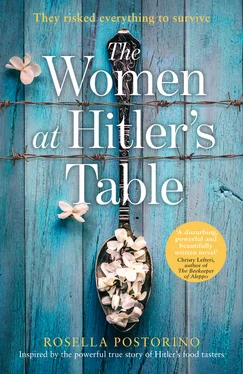I had ordered a slice of apple pie but hadn’t tasted it yet. Gregor pointed this out. Don’t you like it? he asked. I don’t know, I said, laughing. I pushed the plate forward, offering it to him, and when I saw him put the first piece into his mouth and chew quickly, with his customary enthusiasm, I wanted to as well. And so I took a bite, and then another, and we found ourselves eating from the same plate, chattering about nothing in particular without looking at each other, as though that were already too intimate, until our forks suddenly touched. When they did we fell silent, looking up. We stared at each other for a long while, as the birds continued to circle overhead or came to rest on branches, on balustrades, lampposts, who knew, perhaps they were diving down to plunge beak-first into the river, never again to emerge. Then Gregor pinned my fork down with his, and it was as if he were touching me.
HERTA CAME OUTSIDE to collect the eggs later than usual. Perhaps she too had spent a sleepless night and was having a hard time waking up that morning. She found me there, sitting on the rusty metal chair, Zart curled up on top of my feet. She sat down beside me, forgetting about breakfast. The door creaked.
“What, are they here already?” Herta asked.
Leaning against the doorframe, Joseph shook his head. “Eggs,” he replied, gesturing at the henhouse. Zart scampered after him, and I missed his warmth.
The soft glow of sunrise had withdrawn like the tide, laying the morning sky bare, pale, drained. The hens began to squawk, the birds to twitter, the bees to buzz against that circle of light overhead, but the squeal of a vehicle coming to a halt silenced them.
“Get up, Rosa Sauer!” we heard them shout.
Herta and I leapt to our feet and Joseph returned carrying the eggs. He didn’t notice he’d clutched one of them too tightly and had broken its shell, the yolk oozing through his fingers in viscous rivulets of bright orange. I stared at them. They were about to drip from his skin and would hit the ground without making a sound.
“Hurry up, Rosa Sauer!” the SS officers insisted.
Herta touched my back and I moved.
I chose to await Gregor’s return. To believe the war would end. I chose to eat.
IN THE BUS, I glanced around and sat in the first empty spot, far from the other women. There were four of them, two sitting next to each other, the others sitting on their own. I couldn’t remember their names. I only knew Leni’s, and she hadn’t been picked up yet.
No one replied when I said good morning. I looked at Herta and Joseph through the window, which was streaked with dried rain. Standing by the doorway, she raised her arm despite her arthritis, he still held a broken egg in his hand. I watched the house as it fell behind—its moss-darkened shingles, the pink paint, the valerian blossoms that grew in clusters from the bare earth—until it disappeared behind the bend. I would watch it every morning as though I were never to see it again. Until one day I no longer felt that longing.
THE HEADQUARTERS WERE three kilometers from Gross-Partsch, hidden in the forest, invisible from the air. When the workers began to build it, Joseph told me, the locals wondered why there was all that coming and going of vans and trucks. The Soviet military airplanes had never detected it. But we knew Hitler was there, that he slept not far away, and perhaps in summer he would toss and turn in his bed, slapping at the mosquitoes that disturbed his slumber. Perhaps he too would rub the red bites, overcome by the conflicting desires caused by the itch: though you couldn’t stand the archipelago of bumps on your skin, part of you didn’t want them to heal because the relief of scratching them was so intense.
They called it the Wolfsschanze, the Wolf’s Lair. “Wolf” was his nickname. As hapless as Little Red Riding Hood, I had ended up in his belly. A legion of hunters was out looking for him, and to get him in their grips they would gladly slay me as well.
3 Contents Cover Title Page THE WOMEN AT HITLER’S TABLE Rosella Postorino Translated from the Italian by Leah Janeczko Copyright Epigraph Part One Chapter 1 Chapter 2 Chapter 3 Chapter 4 Chapter 5 Chapter 6 Chapter 7 Chapter 8 Chapter 9 Chapter 10 Chapter 11 Chapter 12 Part Two Chapter 13 Chapter 14 Chapter 15 Chapter 16 Chapter 17 Chapter 18 Chapter 19 Chapter 20 Chapter 21 Chapter 22 Chapter 23 Chapter 24 Chapter 25 Chapter 26 Chapter 27 Chapter 28 Chapter 29 Chapter 30 Chapter 31 Chapter 32 Chapter 33 Chapter 34 Chapter 35 Chapter 36 Chapter 37 Chapter 38 Chapter 39 Chapter 40 Chapter 41 Chapter 42 Chapter 43 Part Three Chapter 44 Chapter 45 Chapter 46 Chapter 47 Chapter 48 Notes and Acknowledgments About the Publisher
Once we arrived in Krausendorf, they lined us up and walked us single file to a red-brick schoolhouse that had been set up as military barracks. We crossed the threshold as docile as cows. The SS guards stopped us in the hallway, searched us. It was terrible to feel their hands linger on my sides, under my arms, and not be able to do anything but hold my breath.
We answered the roll call and they marked down attendance in a register. I discovered that the brunette who had wrenched Leni’s shoulder was named Elfriede Kuhn.
Two by two, we were made to enter a room that smelled of alcohol while the others waited their turn outside. I rested my elbow on the school desk in front of me. A man in a white coat tied a tourniquet tightly around my arm and tapped on my vein with his pointer and middle fingers. With the drawing of blood samples, we were officially test animals. While the day before might have been seen as an inauguration, a rehearsal, as of this moment our work as food tasters had officially begun.
When the needle pierced my vein I looked away. Elfriede was beside me, staring at the syringe that drew her blood, filling up with a red color that grew darker and darker. I had never been able to stand the sight of my own blood—recognizing the dark liquid as something that came from inside of me made me dizzy—so I looked at her instead, at her posture straight as two Cartesian axes, her indifference. I sensed Elfriede was a woman of beauty, though I still couldn’t see it. Her beauty was a mathematical theory I had yet to prove.
Before I knew it, her profile became a face glaring at me sharply. Her nostrils flared, as if lacking air. I opened my mouth to catch my breath and said nothing.
“Keep pressure on this,” the man in the white coat told me, pressing a cotton ball against my skin.
I heard Elfriede’s tourniquet come off with a snap and her chair scrape the floor. I too stood up.
IN THE LUNCHROOM I waited for the others to sit down before me. Most of the women chose the same place they had sat in the day before. The chair across from Leni was free, and from then on it was mine.
After breakfast—milk and fruit—they served us lunch. On my plate, asparagus pie. With time I would come to learn that giving different food combinations to different groups of us was one of their control procedures.
I studied the lunchroom as one studies a foreign environment—the windows with iron grilles, the French door leading to the courtyard guarded at all times, the pictureless walls. On my first day of school, when my mother had left me in the classroom and walked out, the thought that something bad might happen to me without her knowing about it filled me with sorrow. What affected me wasn’t the danger of the world around me but my mother’s powerlessness. It seemed intolerable that my life could go on happening with her oblivious to it. Whatever remained concealed, even if not on purpose, was already a betrayal. I had searched the classroom for a crack in the wall, a spiderweb, anything that might be mine, like a secret. My eyes wandered the room, which seemed enormous, and finally noticed a missing fragment of baseboard, which calmed me.
Читать дальше












